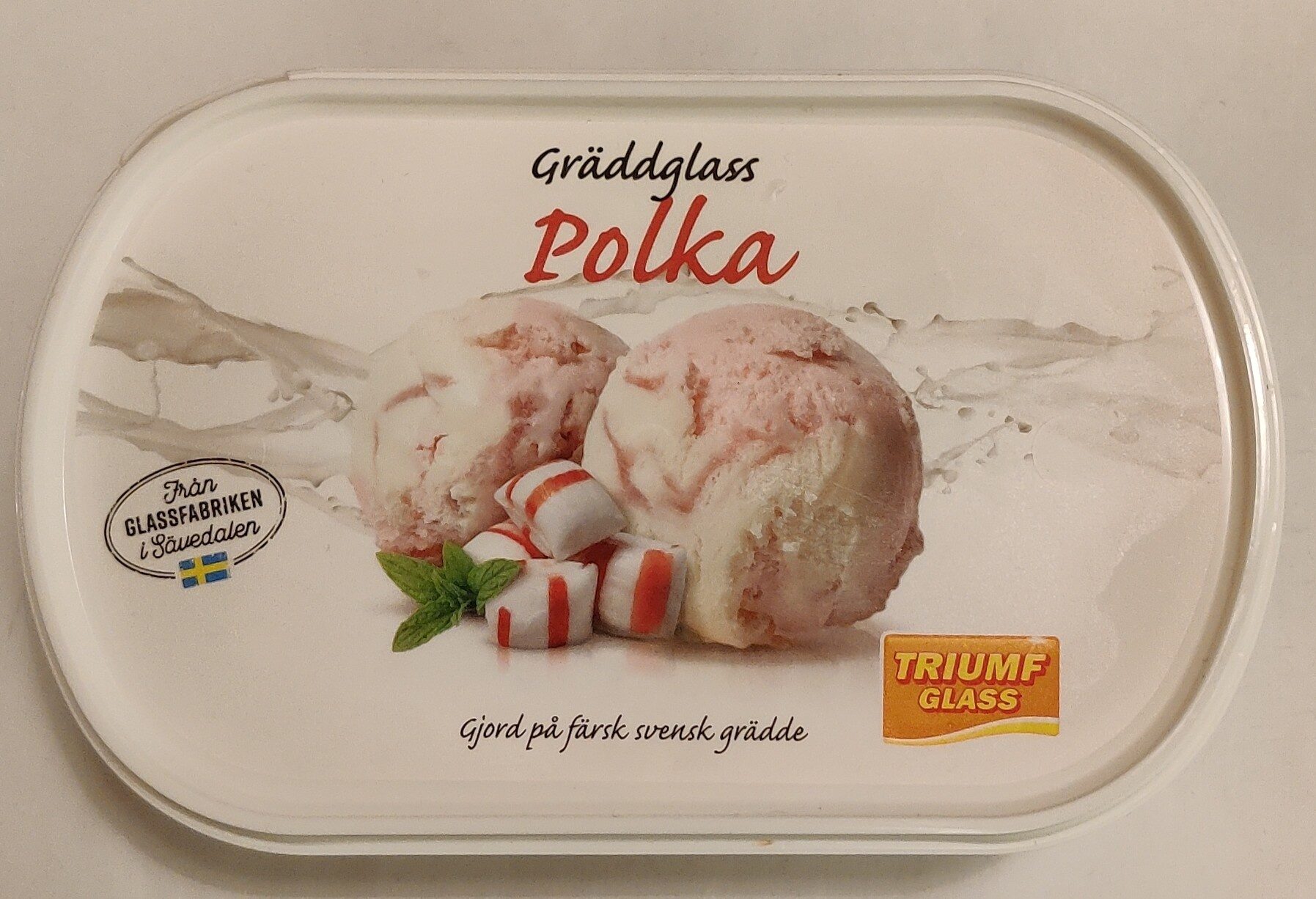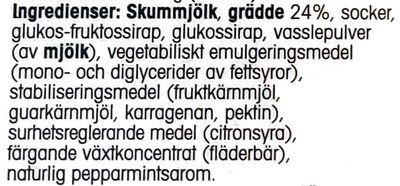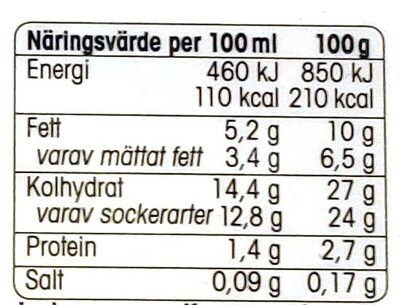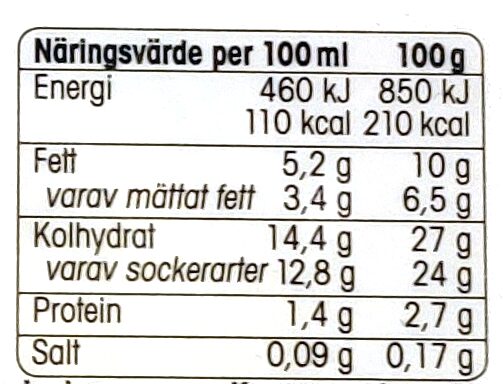Help us make food transparency the norm!
As a non-profit organization, we depend on your donations to continue informing consumers around the world about what they eat.
The food revolution starts with you!
Gräddglass Polka - Triumf Glass - 264 g (500 ml)
Gräddglass Polka - Triumf Glass - 264 g (500 ml)
This product page is not complete. You can help to complete it by editing it and adding more data from the photos we have, or by taking more photos using the app for Android or iPhone/iPad. Thank you!
×
Barcode: 7312060502206 (EAN / EAN-13)
Common name: Polkagräddglass med pepparmintsås.
Quantity: 264 g (500 ml)
Packaging: Plastic
Brands: Triumf Glass, Triumf
Categories: Desserts, Frozen foods, Frozen desserts, Ice creams and sorbets, Ice creams, Ice cream tubs
Labels, certifications, awards:
Green Dot
Stores: Coop
Countries where sold: Sweden
Matching with your preferences
Health
Ingredients
-
19 ingredients
: Skummjölk, grädde 24%, socker, glukos-fruktossirap, glukossirap, vasslepulver (av mjölk), vegetabiliskt emulgeringsmedel (mono - och diglycerider av fettsyror), stabiliseringsmedel (fruktkärnmjöl, guarkärnmjöl, karragenan, pektin), surhetsreglerande medel (citronsyra), färgande växtkoncentrat (fläderbär), naturlig pepparmintsarom.Allergens: Milk
Food processing
-
Ultra processed foods
Elements that indicate the product is in the 4 - Ultra processed food and drink products group:
- Additive: E407 - Carrageenan
- Additive: E412 - Guar gum
- Additive: E471 - Mono- and diglycerides of fatty acids
- Ingredient: Flavouring
- Ingredient: Glucose
- Ingredient: Glucose syrup
- Ingredient: Whey
Food products are classified into 4 groups according to their degree of processing:
- Unprocessed or minimally processed foods
- Processed culinary ingredients
- Processed foods
- Ultra processed foods
The determination of the group is based on the category of the product and on the ingredients it contains.
Additives
-
E330 - Citric acid
Citric acid is a natural organic acid found in citrus fruits such as lemons, oranges, and limes.
It is widely used in the food industry as a flavor enhancer, acidulant, and preservative due to its tart and refreshing taste.
Citric acid is safe for consumption when used in moderation and is considered a generally recognized as safe (GRAS) food additive by regulatory agencies worldwide.
-
E407 - Carrageenan
Carrageenan (E407), derived from red seaweed, is widely employed in the food industry as a gelling, thickening, and stabilizing agent, notably in dairy and meat products.
It can exist in various forms, each imparting distinct textural properties to food.
However, its degraded form, often referred to as poligeenan, has raised health concerns due to its potential inflammatory effects and its classification as a possible human carcinogen (Group 2B) by the International Agency for Research on Cancer (IARC).
Nevertheless, food-grade carrageenan has been deemed safe by various regulatory bodies when consumed in amounts typically found in food.
-
E412 - Guar gum
Guar gum (E412) is a natural food additive derived from guar beans.
This white, odorless powder is valued for its remarkable thickening and stabilizing properties, making it a common ingredient in various food products, including sauces, dressings, and ice creams.
When used in moderation, guar gum is considered safe for consumption, with no known adverse health effects.
-
E440a - Pectin
Pectin: Pectin -from Ancient Greek: πηκτικός pēktikós, "congealed, curdled"- is a structural heteropolysaccharide contained in the primary cell walls of terrestrial plants. It was first isolated and described in 1825 by Henri Braconnot. It is produced commercially as a white to light brown powder, mainly extracted from citrus fruits, and is used in food as a gelling agent, particularly in jams and jellies. It is also used in dessert fillings, medicines, sweets, as a stabilizer in fruit juices and milk drinks, and as a source of dietary fiber.Source: Wikipedia
-
E471 - Mono- and diglycerides of fatty acids
Mono- and diglycerides of fatty acids (E471), are food additives commonly used as emulsifiers in various processed foods.
These compounds consist of glycerol molecules linked to one or two fatty acid chains, which help stabilize and blend water and oil-based ingredients. E471 enhances the texture and shelf life of products like margarine, baked goods, and ice cream, ensuring a smooth and consistent texture.
It is generally considered safe for consumption within established regulatory limits.
Ingredients analysis
-
May contain palm oil
Ingredients that may contain palm oil: E471
-
Non-vegan
Non-vegan ingredients: Skimmed milk, Cream, Whey powder, MilkSome ingredients could not be recognized.
We need your help!
You can help us recognize more ingredients and better analyze the list of ingredients for this product and others:
- Edit this product page to correct spelling mistakes in the ingredients list, and/or to remove ingredients in other languages and sentences that are not related to the ingredients.
- Add new entries, synonyms or translations to our multilingual lists of ingredients, ingredient processing methods, and labels.
If you would like to help, join the #ingredients channel on our Slack discussion space and/or learn about ingredients analysis on our wiki. Thank you!
-
Vegetarian status unknown
Unrecognized ingredients: sv:vegetabiliskt-emulgeringsmedel, sv:färgande-växtkoncentratSome ingredients could not be recognized.
We need your help!
You can help us recognize more ingredients and better analyze the list of ingredients for this product and others:
- Edit this product page to correct spelling mistakes in the ingredients list, and/or to remove ingredients in other languages and sentences that are not related to the ingredients.
- Add new entries, synonyms or translations to our multilingual lists of ingredients, ingredient processing methods, and labels.
If you would like to help, join the #ingredients channel on our Slack discussion space and/or learn about ingredients analysis on our wiki. Thank you!
-
Details of the analysis of the ingredients
We need your help!
Some ingredients could not be recognized.
We need your help!
You can help us recognize more ingredients and better analyze the list of ingredients for this product and others:
- Edit this product page to correct spelling mistakes in the ingredients list, and/or to remove ingredients in other languages and sentences that are not related to the ingredients.
- Add new entries, synonyms or translations to our multilingual lists of ingredients, ingredient processing methods, and labels.
If you would like to help, join the #ingredients channel on our Slack discussion space and/or learn about ingredients analysis on our wiki. Thank you!
: Skummjölk, grädde 24%, socker, glukos-fruktossirap, glukossirap, vasslepulver (av mjölk), vegetabiliskt emulgeringsmedel (mono- och diglycerider av fettsyror), stabiliseringsmedel (fruktkärnmjöl, guarkärnmjöl, karragenan, pektin), surhetsreglerande medel (citronsyra), färgande växtkoncentrat (fläderbär), naturlig pepparmintsarom- Skummjölk -> en:skimmed-milk - vegan: no - vegetarian: yes - ciqual_proxy_food_code: 19051 - percent_min: 24 - percent_max: 76
- grädde -> en:cream - vegan: no - vegetarian: yes - ciqual_food_code: 19402 - percent_min: 24 - percent: 24 - percent_max: 24
- socker -> en:sugar - vegan: yes - vegetarian: yes - ciqual_proxy_food_code: 31016 - percent_min: 0 - percent_max: 24
- glukos-fruktossirap -> en:glucose-fructose-syrup - vegan: yes - vegetarian: yes - ciqual_food_code: 31077 - percent_min: 0 - percent_max: 24
- glukossirap -> en:glucose-syrup - vegan: yes - vegetarian: yes - ciqual_proxy_food_code: 31016 - percent_min: 0 - percent_max: 17.3333333333333
- vasslepulver -> en:whey-powder - vegan: no - vegetarian: maybe - percent_min: 0 - percent_max: 13
- av mjölk -> en:milk - vegan: no - vegetarian: yes - ciqual_proxy_food_code: 19051 - percent_min: 0 - percent_max: 13
- vegetabiliskt emulgeringsmedel -> sv:vegetabiliskt-emulgeringsmedel - percent_min: 0 - percent_max: 10.4
- mono- och diglycerider av fettsyror -> en:e471 - vegan: maybe - vegetarian: maybe - from_palm_oil: maybe - percent_min: 0 - percent_max: 10.4
- stabiliseringsmedel -> en:stabiliser - percent_min: 0 - percent_max: 8.66666666666667
- fruktkärnmjöl -> en:carob-seed-flour - vegan: yes - vegetarian: yes - ciqual_proxy_food_code: 9410 - percent_min: 0 - percent_max: 8.66666666666667
- guarkärnmjöl -> en:e412 - vegan: yes - vegetarian: yes - percent_min: 0 - percent_max: 4.33333333333333
- karragenan -> en:e407 - vegan: yes - vegetarian: yes - percent_min: 0 - percent_max: 2.88888888888889
- pektin -> en:e440a - vegan: yes - vegetarian: yes - percent_min: 0 - percent_max: 2.16666666666667
- surhetsreglerande medel -> en:acidity-regulator - percent_min: 0 - percent_max: 7.42857142857143
- citronsyra -> en:e330 - vegan: yes - vegetarian: yes - percent_min: 0 - percent_max: 7.42857142857143
- färgande växtkoncentrat -> sv:färgande-växtkoncentrat - percent_min: 0 - percent_max: 6.5
- fläderbär -> en:elderberry - vegan: yes - vegetarian: yes - ciqual_food_code: 13126 - percent_min: 0 - percent_max: 6.5
- naturlig pepparmintsarom -> en:natural-peppermint-flavouring - vegan: maybe - vegetarian: maybe - percent_min: 0 - percent_max: 5
Nutrition
-
Poor nutritional quality
⚠ ️Warning: the amount of fruits, vegetables and nuts is not specified on the label, it was estimated from the list of ingredients: 0This product is not considered a beverage for the calculation of the Nutri-Score.
Positive points: 0
- Proteins: 1 / 5 (value: 2.7, rounded value: 2.7)
- Fiber: 0 / 5 (value: 0, rounded value: 0)
- Fruits, vegetables, nuts, and colza/walnut/olive oils: 0 / 5 (value: 0.109375, rounded value: 0.1)
Negative points: 13
- Energy: 2 / 10 (value: 850, rounded value: 850)
- Sugars: 5 / 10 (value: 24, rounded value: 24)
- Saturated fat: 6 / 10 (value: 6.5, rounded value: 6.5)
- Sodium: 0 / 10 (value: 68, rounded value: 68)
The points for proteins are not counted because the negative points are greater or equal to 11.
Nutritional score: (13 - 0)
Nutri-Score:
-
Nutrient levels
-
Fat in moderate quantity (10%)
What you need to know- A high consumption of fat, especially saturated fats, can raise cholesterol, which increases the risk of heart diseases.
Recommendation: Limit the consumption of fat and saturated fat- Choose products with lower fat and saturated fat content.
-
Saturated fat in high quantity (6.5%)
What you need to know- A high consumption of fat, especially saturated fats, can raise cholesterol, which increases the risk of heart diseases.
Recommendation: Limit the consumption of fat and saturated fat- Choose products with lower fat and saturated fat content.
-
Sugars in high quantity (24%)
What you need to know- A high consumption of sugar can cause weight gain and tooth decay. It also augments the risk of type 2 diabetes and cardio-vascular diseases.
Recommendation: Limit the consumption of sugar and sugary drinks- Sugary drinks (such as sodas, fruit beverages, and fruit juices and nectars) should be limited as much as possible (no more than 1 glass a day).
- Choose products with lower sugar content and reduce the consumption of products with added sugars.
-
Salt in low quantity (0.17%)
What you need to know- A high consumption of salt (or sodium) can cause raised blood pressure, which can increase the risk of heart disease and stroke.
- Many people who have high blood pressure do not know it, as there are often no symptoms.
- Most people consume too much salt (on average 9 to 12 grams per day), around twice the recommended maximum level of intake.
Recommendation: Limit the consumption of salt and salted food- Reduce the quantity of salt used when cooking, and don't salt again at the table.
- Limit the consumption of salty snacks and choose products with lower salt content.
-
-
Nutrition facts
Nutrition facts As sold
for 100 g / 100 mlCompared to: Ice cream tubs Energy 850 kj
(210 kcal)-3% Fat 10 g -2% Saturated fat 6.5 g +2% Carbohydrates 27 g +7% Sugars 24 g +11% Fiber - Proteins 2.7 g -19% Salt 0.17 g +10% Fruits‚ vegetables‚ nuts and rapeseed‚ walnut and olive oils (estimate from ingredients list analysis) 0.109 %
Environment
-
Eco-Score B - Low environmental impact
⚠ ️Select a country in order to include the full impact of transportation.The Eco-Score is an experimental score that summarizes the environmental impacts of food products.→ The Eco-Score was initially developped for France and it is being extended to other European countries. The Eco-Score formula is subject to change as it is regularly improved to make it more precise and better suited to each country.Life cycle analysis
-
Average impact of products of the same category: A (Score: 87/100)
Category: Ice cream, cone (normal size)
Category: Ice cream, cone (normal size)
- PEF environmental score: 0.22 (the lower the score, the lower the impact)
- including impact on climate change: 1.75 kg CO2 eq/kg of product
Stage Impact Agriculture
56.9 %Processing
18.1 %Packaging
6.7 %Transportation
6.9 %Distribution
7.2 %Consumption
4.2 %
Bonuses and maluses
-
Missing origins of ingredients information
Malus: -5
⚠ ️ The origins of the ingredients of this product are not indicated.
If they are indicated on the packaging, you can modify the product sheet and add them.
If you are the manufacturer of this product, you can send us the information with our free platform for producers.
-
Packaging with a medium impact
Malus: -10
Shape Material Recycling Impact Unknown Unknown High ⚠ ️ The information about the packaging of this product is not sufficiently precise (exact shapes and materials of all components of the packaging).⚠ ️ For a more precise calculation of the Eco-Score, you can modify the product page and add them.
If you are the manufacturer of this product, you can send us the information with our free platform for producers.
Eco-Score for this product
-
Impact for this product: B (Score: 72/100)
Product: Gräddglass Polka - Triumf Glass - 264 g (500 ml)
Life cycle analysis score: 87
Sum of bonuses and maluses: -15
Final score: 72/100
-
Carbon footprint
-
Equal to driving 0.9 km in a petrol car
175 g CO² per 100g of product
The carbon emission figure comes from ADEME's Agribalyse database, for the category: Ice cream, cone (normal size) (Source: ADEME Agribalyse Database)
Stage Impact Agriculture
61.0 %Processing
12.3 %Packaging
10.3 %Transportation
11.3 %Distribution
3.7 %Consumption
1.4 %
Packaging
-
Packaging with a medium impact
-
Packaging parts
Unknown
-
Packaging materials
Material % Packaging weight Packaging weight per 100 g of product
-
Transportation
-
Origins of ingredients
Missing origins of ingredients information
⚠ ️ The origins of the ingredients of this product are not indicated.
If they are indicated on the packaging, you can modify the product sheet and add them.
If you are the manufacturer of this product, you can send us the information with our free platform for producers.Add the origins of ingredients for this product Add the origins of ingredients for this product
Report a problem
-
Incomplete or incorrect information?
Category, labels, ingredients, allergens, nutritional information, photos etc.
If the information does not match the information on the packaging, please complete or correct it. Open Food Facts is a collaborative database, and every contribution is useful for all.













